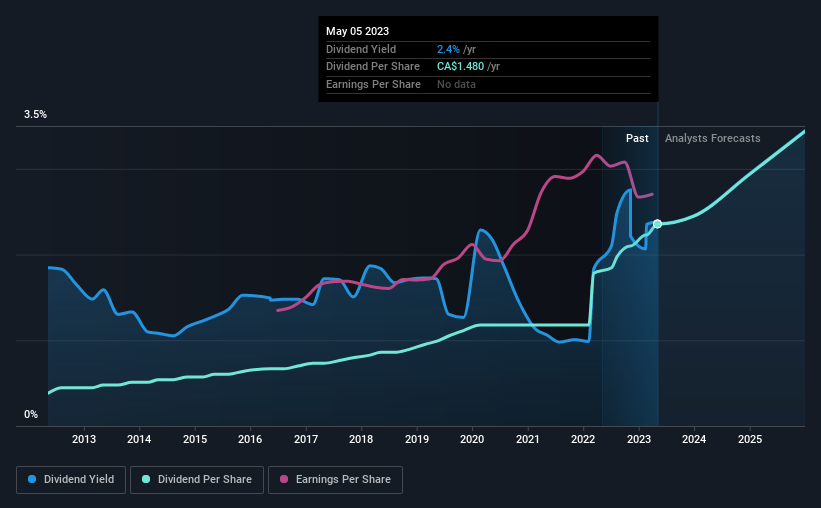EQB Inc. (TSE:EQB) will increase its dividend from last year's comparable payment on the 30th of June to CA$0.37. Even though the dividend went up, the yield is still quite low at only 2.4%.
Check out our latest analysis for EQB
EQB's Payment Expected To Have Solid Earnings Coverage
It would be nice for the yield to be higher, but we should also check if higher levels of dividend payment would be sustainable.
EQB has established itself as a dividend paying company with over 10 years history of distributing earnings to shareholders. Using data from its latest earnings report, EQB's payout ratio sits at 16%, an extremely comfortable number that shows that it can pay its dividend.
Over the next 3 years, EPS is forecast to expand by 62.3%. Analysts forecast the future payout ratio could be 16% over the same time horizon, which is a number we think the company can maintain.

EQB Has A Solid Track Record
Even over a long history of paying dividends, the company's distributions have been remarkably stable. Since 2013, the annual payment back then was CA$0.24, compared to the most recent full-year payment of CA$1.48. This implies that the company grew its distributions at a yearly rate of about 20% over that duration. It is good to see that there has been strong dividend growth, and that there haven't been any cuts for a long time.
EQB Could Grow Its Dividend
Investors who have held shares in the company for the past few years will be happy with the dividend income they have received. EQB has impressed us by growing EPS at 9.5% per year over the past five years. A low payout ratio and decent growth suggests that the company is reinvesting well, and it also has plenty of room to increase the dividend over time.
An additional note is that the company has been raising capital by issuing stock equal to 10% of shares outstanding in the last 12 months. Trying to grow the dividend when issuing new shares reminds us of the ancient Greek tale of Sisyphus - perpetually pushing a boulder uphill. Companies that consistently issue new shares are often suboptimal from a dividend perspective.
We Really Like EQB's Dividend
In summary, it is always positive to see the dividend being increased, and we are particularly pleased with its overall sustainability. Distributions are quite easily covered by earnings, which are also being converted to cash flows. All in all, this checks a lot of the boxes we look for when choosing an income stock.
Investors generally tend to favour companies with a consistent, stable dividend policy as opposed to those operating an irregular one. However, there are other things to consider for investors when analysing stock performance. For example, we've identified 3 warning signs for EQB (1 is a bit unpleasant!) that you should be aware of before investing. Looking for more high-yielding dividend ideas? Try our collection of strong dividend payers.
Valuation is complex, but we're here to simplify it.
Discover if EQB might be undervalued or overvalued with our detailed analysis, featuring fair value estimates, potential risks, dividends, insider trades, and its financial condition.
Access Free AnalysisHave feedback on this article? Concerned about the content? Get in touch with us directly. Alternatively, email editorial-team (at) simplywallst.com.
This article by Simply Wall St is general in nature. We provide commentary based on historical data and analyst forecasts only using an unbiased methodology and our articles are not intended to be financial advice. It does not constitute a recommendation to buy or sell any stock, and does not take account of your objectives, or your financial situation. We aim to bring you long-term focused analysis driven by fundamental data. Note that our analysis may not factor in the latest price-sensitive company announcements or qualitative material. Simply Wall St has no position in any stocks mentioned.
About TSX:EQB
EQB
Through its subsidiary, Equitable Bank, provides personal and commercial banking services to retail and commercial customers in Canada.
Undervalued established dividend payer.
Similar Companies
Market Insights
Weekly Picks


Crazy Undervalued 42 Baggers Silver Play (Active & Running Mine)


Fiducian: Compliance Clouds or Value Opportunity?

Willamette Valley Vineyards (WVVI): Not-So-Great Value
Recently Updated Narratives


The Great Strategy Swap – Selling "Old Auto" to Buy "Future Light"


Not a Bubble, But the "Industrial Revolution 4.0" Engine


The "David vs. Goliath" AI Trade – Why Second Place is Worth Billions
Popular Narratives


MicroVision will explode future revenue by 380.37% with a vision towards success


NVDA: Expanding AI Demand Will Drive Major Data Center Investments Through 2026



